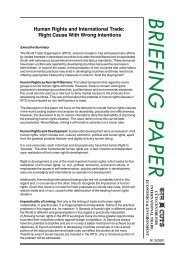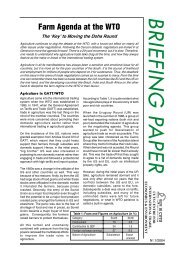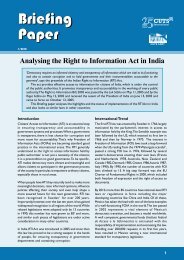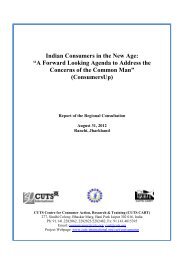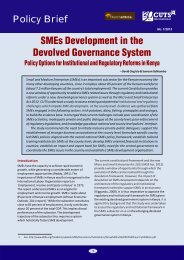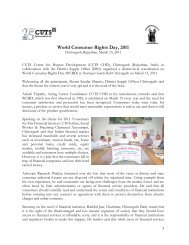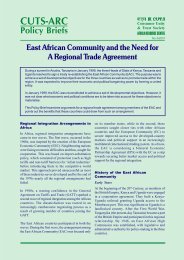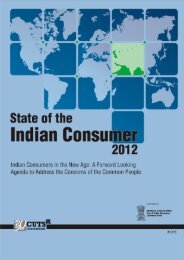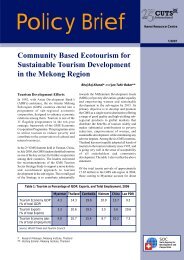Usages of RTI in Rural Rajasthan, India - Consumer Unity & Trust ...
Usages of RTI in Rural Rajasthan, India - Consumer Unity & Trust ...
Usages of RTI in Rural Rajasthan, India - Consumer Unity & Trust ...
Create successful ePaper yourself
Turn your PDF publications into a flip-book with our unique Google optimized e-Paper software.
PIOs/FAAs <strong>in</strong> OfficesWhen Panchayat <strong>of</strong>ficials were asked about the PIO <strong>of</strong> their <strong>of</strong>fice, most <strong>of</strong> them werenot aware about it and general perception among both Sarpanch and Gram Sachivswas that the Sarpanch is the PIO <strong>of</strong> the Gram Panchayat, which is wrong. Only 54percent respondents know about the fact that Gram Sachiv has been designated as PIOat Gram Panchayat level and only 36 percent respondents know about the FAA which isthe Sarpanch <strong>of</strong> the Gram Panchayat.Facts About PIOs/FAAs (%)Response <strong>of</strong> PIOs before accept<strong>in</strong>g <strong>RTI</strong> Applications: Most PIOs ask the applicantsabout the <strong>in</strong>tended use <strong>of</strong> the demanded <strong>in</strong>formation. 14 percent <strong>of</strong> the PIO respondentsaccepted that they dissuade applicants on the plea that the <strong>in</strong>formation sought doesnot relate to any public welfare. 19 percent <strong>of</strong> the PIOs check personal/politicalmotivation as well. 50 percent <strong>of</strong> the respondents thought that it was legal to ask theapplicants for the reasons <strong>of</strong> fil<strong>in</strong>g a request under <strong>RTI</strong>.Rejection <strong>of</strong> <strong>RTI</strong> ApplicationsRespondent PIOs, when asked about the possible grounds on which <strong>RTI</strong> applicationscould be rejected, were very cautious to respond. However, 32 percent <strong>of</strong> the PIOs saidthat applications can be rejected if the <strong>in</strong>formation sought is related to any otherdepartment. 30 percent said if the applicant is likely to misuse the demanded<strong>in</strong>formation, then his application would not be accepted. 17 percent said thatapplications were also rejected on account <strong>of</strong> a large number <strong>of</strong> questions or if theapplicant’s behaviour with them is not proper. Other reasons for rejection are<strong>in</strong>formation demanded is not clear or demanded <strong>in</strong>formation is not available withPIOs or address <strong>of</strong> the applicant is not written on the application.In the post-RGR survey, two major categories <strong>of</strong> grounds for rejection came up: one, ifthe application is related to some other department; and, two, if they th<strong>in</strong>k thatapplicants would <strong>in</strong> any way misuse the requested <strong>in</strong>formation.40Model Framework for Replication: <strong>Usages</strong> <strong>of</strong> <strong>RTI</strong> <strong>in</strong> <strong>Rural</strong> <strong>Rajasthan</strong>, <strong>India</strong>



